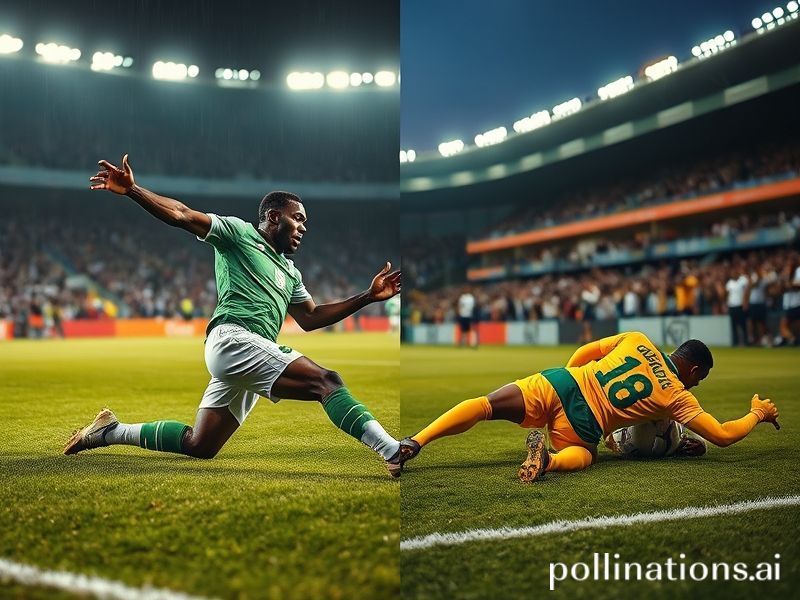Nigeria vs South Africa: When Football Becomes a Geopolitical Cage Match the World Can’t Ignore
Nigeria vs South Africa: A Fever-Pitch Rivalry That Outshines Your Netflix Queue
The world’s attention has once again pivoted to the patch of Earth that cartographers once labelled “sub-Saharan” but marketing teams now call “Africa’s Growth Belt.” This week, Lagos and Johannesburg are locked in the sort of contest that makes Eurovision look like a knitting circle: a football showdown whose geopolitical subtext is thicker than the Harmattan haze.
At first glance, it’s merely a qualifying match for the next continental jamboree. Yet the fixture has already triggered a run on generators (Nigeria) and artisanal gin (South Africa), while global betting houses—those impartial arbiters of human hope—report volumes normally reserved for US election nights. One London trader confessed to moving more naira-rand hedges than pound-euro, “because nobody trusts either currency, but everybody trusts the hatred.”
The rivalry is older than Wi-Fi and twice as unstable. Nigeria, population 220 million and counting, exports crude oil, Afrobeats, and an unshakeable belief that loudness equals victory. South Africa, population 62 million and shrinking, exports platinum, Chenin Blanc, and a smug conviction that infrastructure is a personality. Both countries treat GDP the way teenagers treat curfews: useful only when parents—or credit-rating agencies—are watching.
Global supply chains, ever the neurotic stage manager, are watching indeed. A Nigerian win would send Lagos social media into such delirious overdrive that Twitter’s servers (still housed somewhere in Atlanta, irony noted) might wilt under celebratory memes. A South African victory would spike demand for vuvuzelas, those plastic trumpets that double as marital aids in niche internet forums, and therefore for Chinese petrochemical derivatives. Either way, Shenzhen wins—proof that even African grudge matches now come with Made-in-China subtitles.
Diplomatically, the match is a masterclass in passive aggression. Nigeria’s foreign ministry issued a statement wishing South Africa “all the best in the spirit of pan-African fraternity,” which veteran translators rendered as “may your flights be delayed and your VAR reviews cursed.” Pretoria responded with a press release praising Nigerian “energy,” widely understood to mean “please stop emailing us 419 schemes.” Meanwhile, small neighbouring states like Ghana and Botswana have activated popcorn protocols, quietly relieved that for once the spotlight is elsewhere.
Western observers, still recovering from the shock that “Africa” contains more than one country, have dispatched think-tank interns to investigate “emerging-market sentiment.” Their preliminary finding is that sentiment is mostly vengeful, but expressed in GIFs rather than white papers. Brussels, terrified that post-match riots might dent its critical cobalt supply, has offered “electoral observer missions,” apparently unaware this is sport, not democracy—though the distinction is admittedly slim.
China, ever the pragmatist, has shipped in extra Huawei-branded stadium Wi-Fi routers, ensuring that every gloating selfie reaches TikTok in 4K. Russia’s oligarchs, bored with sanctions, have reportedly placed cryptic bets involving palladium futures and a mysterious Lagos penthouse. And somewhere in Silicon Valley, an AI ethics committee is frantically drafting guidelines for chatbots that might have to explain why “jollof vs biltong” has become a geopolitical flashpoint.
Come full-time, whichever anthem is sung louder will be touted as soft-power triumph. Consultants will bill six figures for slide decks titled “Leveraging Football Fandom for ESG Narratives.” The IMF will link the result to next quarter’s growth revisions, because nothing says macroeconomics like twenty-two men chasing leather. And ordinary citizens, spared such erudition, will simply nurse heartbreak or euphoria until the next distraction—probably a celebrity divorce or a meme coin named after a goalkeeper.
In the end, Nigeria vs South Africa is less about goals than about grievance, less about flags than about fragile egos masquerading as nationhood. Which makes it, tragically, the most honest international summit of the year. After all, when the floodlights die and the hashtags fade, both countries still share the same colonial borders, the same climate debt, and the same WhatsApp forwards blaming the other for everything from inflation to bad juju. The scoreboard resets, but the score never really does. And somewhere in a London trading room, a yawn: “Same time next qualifier?”







